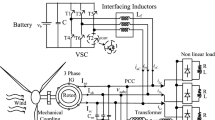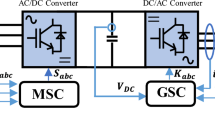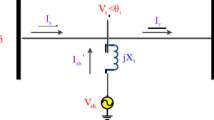Abstract
The reactive power dispatch (RPD) problem is a very critical optimization problem of power system which minimizes the real power loss of the transmission system. While solving the said problem, generator bus voltages and transformer tap settings are kept within a stable operating limit. In connection with the RPD problem, solving reactive power is compensated by incorporating shunt capacitors. The particle swarm optimization (PSO) technique is a swarm intelligence based fast working optimization method which is chosen in this paper as an optimization tool. Additionally, the constriction factor is included with the conventional PSO technique to accelerate the convergence property of the applied optimization tool. In this paper, the RPD problem is solved in the case of the two higher bus systems, i.e., the IEEE 57-bus system and the IEEE 118-bus system. Furthermore, the result of the present paper is compared with a few optimization technique based results to substantiate the effectiveness of the proposed study.
Similar content being viewed by others
References
Bansilal D T, Parthasarathy K. Optimal reactive power dispatch algorithm for voltage stability improvement. Electrical Power and Energy Systems, 1996, 18(70): 461–468
Varadarajan M, Swarup K S. Differential evolution approach for optimal reactive power dispatch. Applied Soft Computing, 2008, 8(4): 1549–1561
Mahadevan K, Kannan P S. Comprehensive learning particle swarm optimization for reactive power dispatch. Applied Soft Computing, 2010, 10(2): 641–652
Subbaraj P, Rajnarayanan P N. Optimal reactive power dispatch using self-adaptive real coded genetic algorithm. Electric Power Systems Research, 2009, 79(2): 374–381
Talbi E-G. Metaheuristics: From Design to Implementation. Hoboken: John Wiley & Sons, 2009
Wu Q H, Ma J T. Power system optimal reactive power dispatch using evolutionary programming. IEEE Transactions on Power Systems, 1995, 10(3): 1243–1249
Abido M A. Optimal power flow using tabu search algorithm. Electrical Power Components Systems, 2002, 30(5): 469–483
Osman MS, Abo-Sinna MA, Mousa A A. A solution to the optimal power flow using genetic algorithm. Applied Mathematics and Computation, 2004, 155(2): 391–405
Abou El Ela A A, Abido M A, Spea A R. Optimal power flow using differential evolutionary algorithm. Electric Power Systems Research, 2010, 80(7): 878–885
Liang C H, Chung C Y, Wong K P, Duan X Z, Tse C T. Study of differential evolution for optimal reactive power flow. IET Generation Transmission Distribution, 2007, 1(2): 253–260
Raha S, Som T, Chakraborty N. Exploration of simulated annealing technique in reactive power dispatch domain. In: proceedings of National conference on recent developments in electrical engineering 2011 (NCRDEE 2011). Jalpaiguri: IE Publishing, 2011, 92–97
Yoshida H, Fukuyama Y, Kawata K, Takayama S, Nakanishi Y. A particle swarm optimization for reactive power and voltage control considering voltage security assessment. IEEE Transactions on Power Systems, 2000, 15(4): 1232–1239
Clerc M. The swarm and the queen: towards a deterministic and adaptive particle swarm optimization. In: Proceedings ICEC. USA: Washington, DC, 1999, 1951–1957
Kennedy J, Eberhart R. Particle swarm optimization. In: Proceedings of IEEE International Conference on Neural Networks. IEEE, 1995, 1942–1948
Shi Y, Eberhart R C. Comparison between genetic algorithms and particle swarm optimization. In: Lecture Notes in Computer Science Volume 1447 — Evolutionary Programming VII. In: Proceedings Seventh International Conference Evolutionary Programming. San Diego: Springer-Verlag Berlin and Heidelberg GmbH & Co. K, 1998, 611–616
Shi Y H, Eberhart R C. A modified particle swarm optimizer. In: Proceedings of IEEE International Conference on Evolutionary Computation. Anchorage, USA, 1998, 69–73
Electrical Engineering, University of Washington. Power system test case archive. 2006-12, http://www.ee.washington.edu/research/pstca
Saadat H. Power System Analysis. 3rd ed. Princeton: McGraw-Hill Primis Custom Publishing, 2008
Brest J, Greiner S, Boskovic B, Mernik M, Zumer V. Self-adapting control parameters in differential evolution: A comparative study on numerical benchmark problems. IEEE Transactions on Evolutionary Computation, 2006, 10(6): 646–657
Wu Q H, Cao Y J, Wen J Y. Optimal reactive power dispatch using an adaptive genetic algorithm. International Journal of Electrical Power & Energy Systems, 1998, 20(8): 563–569
Programs Section of the Particle Swarm Central. Standard PSO 2007 (SPSO-07), 2010-09, http://www.particleswarm.info/Programs.html
Liang J J, Qin A K, Suganthan P N, Baskar S. Comprehensive learning particle swarm optimizer for global optimization of multimodal functions. IEEE Transactions on Evolutionary Computation, 2006, 10(3): 67–82
Qin A K, Suganthan P N. Self-adaptive differential evolution algorithm for numerical optimization. In: Proceedings of IEEE Congress on Evolutionary Computation. Edinburgh, UK, 2005, 1785–1791
Author information
Authors and Affiliations
Corresponding author
Rights and permissions
About this article
Cite this article
Biswas, S., Mandal, K.K. & Chakraborty, N. Constriction factor based particle swarm optimization for analyzing tuned reactive power dispatch. Front. Energy 7, 174–181 (2013). https://doi.org/10.1007/s11708-013-0246-x
Received:
Accepted:
Published:
Issue Date:
DOI: https://doi.org/10.1007/s11708-013-0246-x




